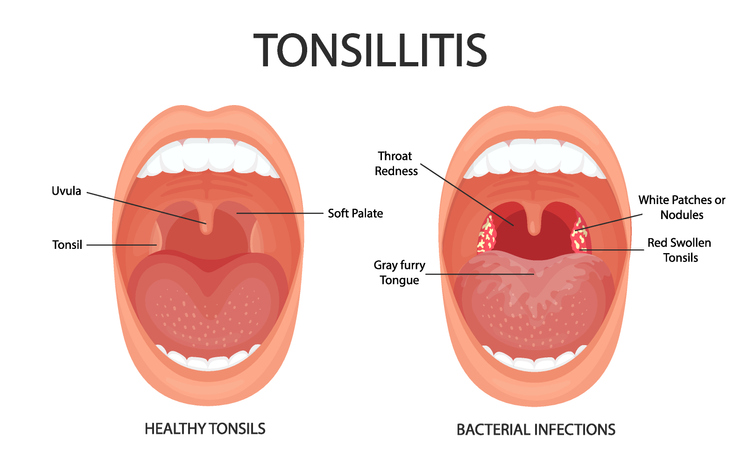Have you ever woken up with a sore throat, only to find your tonsils swollen like balloons?
At PharmaChoice, we understand how this common yet uncomfortable condition can disrupt your life.
Swollen tonsils, often a sign of tonsillitis, can be more than just a minor annoyance.
In this comprehensive guide, we’ll explore the ins and outs of tonsillitis, offering you 8 expert tips on how to cure it.
Let’s dive into understanding this condition and how you can find relief.
What Are Swollen Tonsils – Brief Overview
Tonsillitis is an inflammation of the tonsils, the two lymph nodes located on each side of the back of your throat.
These glands are part of the immune system, playing a crucial role in filtering out bacteria and viruses that enter the body through the mouth and nose.
However, this defensive role makes them particularly vulnerable to infection and inflammation, leading to the condition known as tonsillitis.
When tonsillitis occurs, it not only affects the tonsils but can also impact the overall well-being of an individual, causing a range of symptoms that can disrupt daily life, including sore throat, difficulty swallowing, and general malaise.
The severity of these symptoms can vary depending on the underlying cause of the infection and the individual’s overall health.

Normal vs Inflamed Tonsils
Normal tonsils are generally the same colour as the surrounding throat tissue and blend in seamlessly with the back of the throat.
They are not overly prominent and do not cause discomfort or obstruct the throat. In contrast, inflamed tonsils are quite noticeable.
They become swollen and enlarged, often to the point where they are visibly redder than usual and may protrude significantly.
In cases of infection, they might also have a yellow or white coating, a sign of the body’s immune response to infection.
This visual difference between normal and inflamed tonsils is often one of the first indicators of tonsillitis and can be a useful diagnostic tool.
The appearance of inflamed tonsils can be alarming, but it’s a clear sign that the body is responding to an infection.
The swelling is caused by the immune system’s attempt to fight off the invading bacteria or viruses. This response, while uncomfortable, is a natural part of the body’s defence mechanism.
Types of Tonsillitis
Tonsillitis is not a one-size-fits-all condition and can be classified into three distinct types: acute, recurrent, and chronic.
- Acute tonsillitis:
Characterized by a sudden onset and typically lasts for a short period, usually a few days to a week. This type is most common and often resolves with appropriate treatment and care.
- Recurrent tonsillitis:
Involves several episodes of acute tonsillitis in a year. This can be particularly challenging, as it can disrupt normal life frequently and may require more intensive treatment strategies.
It’s important for individuals with recurrent tonsillitis to work closely with their healthcare providers to manage the condition and reduce the frequency of episodes.
- Chronic tonsillitis:
Persists for longer periods and may not respond to typical treatments as effectively as acute cases.
This type of tonsillitis can lead to persistent sore throat, bad breath, and swollen lymph nodes in the neck.
In some cases, a tonsillectomy, which is the surgical removal of the tonsils, may be considered to alleviate chronic tonsillitis, especially if it significantly affects the quality of life.
Understanding these types of tonsillitis is crucial for effective treatment and management.
Each type may require a different approach, and recognizing the pattern of symptoms can help healthcare providers determine the best course of action.
Tonsillitis Symptoms – First Signs of Tonsillitis
The most common symptoms of tonsillitis are often hard to ignore.
- A sore throat
- Difficulty or painful swallowing
- Swollen lymph nodes in the neck often
- Scratchy-sounding voice.
These symptoms can be accompanied by other signs such as fever, headache, and general malaise.
The fever is a natural response of the body to infection, indicating that the immune system is actively fighting the tonsillitis.
Symptoms in Young Children
In young children, tonsillitis symptoms can manifest differently and may be harder to identify.
- Drooling
- Unwillingness to eat
- Unusual fussiness or irritability
- Decrease in appetite
- Reluctance to drink fluids
Parents and caregivers should also be alert to any changes in their child’s breathing, as swollen tonsils can sometimes obstruct the airway, especially during sleep.
Symptoms of Severe Cases of Swollen Tonsils
In severe cases of tonsillitis, the symptoms become more pronounced and can lead to significant discomfort and health concerns.
- Difficulty breathing caused by the enlarged tonsils obstructing the airway.
- Extreme difficulty swallowing, to the point where saliva cannot be swallowed.
- A persistent sore throat that doesn’t improve with standard home care measures or over-the-counter treatments.
- High fever and possibly a feeling of fatigue or weakness.
These symptoms indicate that the body is struggling to fight the infection and may require more aggressive treatment, such as antibiotics or, in some cases, surgical intervention.
It’s important to monitor these symptoms closely and seek medical advice if they worsen or don’t improve with initial treatment. Early intervention can prevent complications and lead to a quicker recovery.

Tonsillitis Causes – What Can Cause Swollen Tonsils
- Common Viral Causes
Most cases of tonsillitis are caused by common viruses, such as adenoviruses, which are also responsible for the common cold and sore throat.
- Bacterial Tonsillitis (Strep Throat)
Bacterial infections, particularly Group A streptococcus, can also cause tonsillitis, commonly known as strep throat.
- Other Viral Causes
Other viruses, including the influenza virus, herpes viruses, Epstein-Barr virus, and even HIV, can lead to tonsillitis.
Why Do Tonsils Get Infected?
Tonsils are a part of the body’s immune system, strategically positioned at the back of the throat to act as a first line of defence against pathogens entering through the mouth or nose.
However, this frontline position also makes them particularly susceptible to infections.
When tonsils encounter bacteria or viruses, they can become overwhelmed, especially if the pathogens are in large numbers or if the body’s immune response is not strong enough.
This leads to the tonsils themselves becoming infected, resulting in tonsillitis.
Several factors can contribute to the likelihood of tonsils getting infected. These include:
- Exposure to common pathogens like the cold or flu virus
- Poor hygiene practices
- A weakened immune system.
Children and young adults are particularly prone to tonsillitis because their immune systems are still developing and may not be as effective in fighting off infections.
Additionally, environmental factors like exposure to smoke or pollutants can irritate the tonsils and make them more susceptible to infection.
How Does Tonsillitis Spread?
Tonsillitis, particularly when caused by contagious viruses or bacteria, can spread from person to person in several ways.
The most common mode of transmission is through airborne droplets. When an infected person coughs, sneezes, or even talks, they can release droplets containing the virus or bacteria into the air.
These droplets can then be inhaled by others, leading to infection.
Another way tonsillitis can spread is through direct contact with saliva or nasal secretions from an infected person.
This can happen through sharing drinks, food, utensils, or even toys in the case of children.
It’s important to note that while viral tonsillitis is highly contagious, bacterial tonsillitis, such as strep throat, is also easily spread, particularly in close-contact environments like schools and households.
Practicing good hygiene, such as frequent hand washing, covering the mouth and nose when coughing or sneezing, and avoiding close contact with infected individuals, can help reduce the spread of tonsillitis.
Tonsillitis Treatment – Tips To Cure Swollen Tonsils
- Over-the-Counter (OTC) Methods: For viral tonsillitis, OTC pain relievers like ibuprofen or acetaminophen can help alleviate symptoms.
- Antibiotics to Fight the Bacterial Infection: If tonsillitis is caused by bacteria, antibiotics are often necessary. It’s crucial to complete the entire course of antibiotics as prescribed.
- Tonsillectomy (Tonsillitis Surgery): In chronic or recurrent cases, a tonsillectomy, the surgical removal of the tonsils, may be recommended.
Home Remedies For Inflamed Tonsils
Drinking a Lot of Fluids
Stay hydrated with water and warm fluids to soothe the throat and keep the body well-hydrated. Adequate hydration helps in thinning mucus and provides relief from throat irritation.
Herbal teas and warm broths can also be comforting, but avoid beverages that can irritate the throat, like those with caffeine or alcohol.
Getting a Lot of Rest
Rest is crucial for your body to fight off the infection effectively. When you rest, your body can focus its energy on the immune response.
This not only speeds up recovery but also helps in reducing the severity of symptoms. Ensure you get enough sleep at night, and consider taking short naps during the day if needed.
Gargling with Warm Salt Water
Gargling with warm salt water can help reduce swelling and discomfort in the throat.
This simple remedy works by drawing out water from the inflamed tissues, thereby reducing swelling and easing pain.
It also helps in cleaning the throat and can remove irritants or bacteria.
Using a Humidifier
Adding moisture to the air with a humidifier can soothe a sore throat. Dry air can exacerbate throat irritation, making symptoms of tonsillitis more uncomfortable.
A humidifier adds necessary moisture to the air, which can help in keeping your throat moist and reduce discomfort.
Eating Smooth Foods
Eating smooth, soft foods like ice cream or applesauce can be soothing and easy to swallow.
These foods are gentle on the throat and won’t aggravate the pain or swelling. Avoid spicy, acidic, or crunchy foods that can further irritate an already inflamed throat.

Tonsillitis Diagnosis
When you visit a physician with symptoms of tonsillitis, they will first conduct a thorough examination to determine the root cause of your condition.
This examination typically involves a visual inspection of the throat and tonsils, palpation of the lymph nodes in the neck, and a review of your symptoms and medical history.
Based on these initial findings, your physician may recommend specific tests to accurately diagnose the cause of your tonsillitis.
Rapid Strep Test
One of the most common tests for diagnosing tonsillitis, especially when a bacterial infection is suspected, is the rapid strep test.
This test is designed to detect the presence of Group A streptococcus bacteria, which is the most common bacterial cause of tonsillitis.
The rapid strep test is quick and efficient, often providing results within minutes. It involves swabbing the back of the throat and tonsils to collect a sample, which is then tested for the presence of strep bacteria.
If the test comes back positive, your physician will typically prescribe antibiotics to treat the infection.
Throat Culture
If the rapid strep test is negative, but the symptoms strongly suggest a bacterial infection, your physician may order a throat culture.
This test is more comprehensive than the rapid strep test and can detect a wider range of bacteria.
Like the rapid test, it involves swabbing the throat to collect a sample. The sample is then cultured in a laboratory to see if bacteria grow.
It can take a few days to get the results from a throat culture. This test is particularly useful in identifying infections that the rapid strep test may miss.
A Blood Test
In some cases, your physician may also recommend a blood test. This test can help differentiate between a viral and bacterial infection, which is crucial for determining the appropriate treatment.
A complete blood count (CBC) can be used to assess the overall health and detect a variety of disorders, including infections.
For instance, a high number of white blood cells typically indicates an infection. Blood tests can provide valuable information about your overall health and help in the diagnosis of tonsillitis.
Tonsillitis Risk Factors – Who Is At Risk?
- Frequent Germ Exposure: People frequently exposed to germs, especially children and adolescents, are more at risk.
- Young Age: Tonsillitis is more common in children and adolescents due to their developing immune systems.
- The Weather: Cold and flu season typically brings an increase in tonsillitis cases.
- Immune Cells: Individuals with weakened immune systems are more susceptible to infections, including tonsillitis.
Possible Tonsillitis Complications
While tonsillitis is a common and often easily treatable condition, it’s important to be aware of the potential complications that can arise if it’s not properly managed.
These complications can range from local issues in the throat area to more systemic problems affecting other parts of the body.
Understanding these risks underscores the importance of seeking timely medical advice and adhering to prescribed treatments for tonsillitis.
Let’s explore some of the notable complications that can occur as a result of untreated or improperly managed tonsillitis.
- Abscesses: Infection can lead to abscesses around the tonsils.
- Rheumatic Fever: Untreated strep throat can lead to rheumatic fever, a serious condition.
- Obstructive Sleep Apnea: Swollen tonsils can obstruct the airway, leading to sleep apnea.
- Tonsillar Cellulitis: This is an infection of the tissues around the tonsils.
- Tonsil Stones: These are calcified deposits that can form in the crevices of the tonsils.
Tonsillitis Prevention – Can Tonsillitis Be Prevented or Avoided?
- Avoid Sharing Utensils, Food, Drink, or Personal Items: This reduces the risk of spreading germs.
- Wash Your Hands Regularly: Good hygiene is key in preventing tonsillitis.
- Avoid Close Contact with Sick Individuals: This helps prevent the spread of infections.
- Replace Your Toothbrush Often: Especially after a tonsillitis episode.
- Don’t Smoke: Smoking can irritate the throat and increase the risk of tonsillitis.

When To See a Doctor For a Tonsil Infection
Tonsillitis, while often manageable with home care and over-the-counter treatments, can sometimes escalate into a more serious condition requiring medical attention.
It’s crucial to recognize the signs that indicate the need for a doctor’s visit.
Here are some key symptoms and situations when you should consider seeking professional medical advice for a tonsil infection:
- Experiencing Sore Throat with High Fever:
A sore throat accompanied by a high fever could be indicative of a bacterial infection, such as strep throat.
This combination of symptoms suggests that your body is fighting a significant infection that might require antibiotics for treatment.
- Swollen Tonsils for a Day or Two:
If you notice that your tonsils are swollen and the swelling persists for more than a couple of days, it’s advisable to see a doctor.
Persistent swelling could be a sign of an underlying issue that needs medical evaluation and possibly treatment.
- Difficult Swallowing:
If swallowing becomes increasingly painful or challenging, it could indicate that the tonsillitis is worsening and requires medical intervention.
- Recurrent Infections:
If you suffer from frequent bouts of tonsillitis, it’s important to discuss this with your doctor.
Recurrent infections might indicate a need for a more comprehensive treatment plan, which could include a referral to an ENT specialist.
- Earache:
An earache accompanying a sore throat can sometimes be associated with tonsillitis. It can be a sign of spreading infection or a complication of tonsillitis.
People Also Ask…
Is Tonsillitis Contagious?
Yes, tonsillitis can be contagious, especially if caused by a virus or bacteria.
Can Tonsillitis Be Prevented?
While not entirely preventable, good hygiene and avoiding close contact with infected individuals can reduce risk.
How Long Does Tonsillitis Last?
Tonsillitis typically lasts from a few days to a week, depending on the cause.
When Is Tonsillitis an Emergency?
If you have difficulty breathing, extreme difficulty swallowing, or severe pain, seek medical attention immediately.

Ease Tonsillitis & Swollen Tonsils – Talk To Your PharmaChoice Pharmacist Today
While tonsillitis can be a painful and inconvenient condition, there are effective ways to manage and treat it.
Remember, if you’re experiencing persistent or severe symptoms, it’s important to consult with a healthcare provider.
At PharmaChoice, we’re here to help you with the right tonsillitis treatment and medications.
Don’t hesitate to ask your healthcare provider at your closest PharmaChoice pharmacy for advice and support in managing your tonsillitis.



